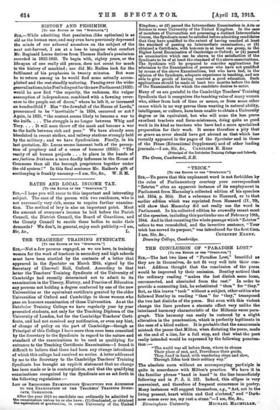THE CONCLUSION OF "PARADISE LOST." [To TER EDITOR Or THE
"SPECTATOR.") SIR,—The last two lines of "Paradise Lost," beautiful as they are in themselves, do not fit very well into their con- text. Addison thought that the conclusion of the poem would be improved by their omission. Bentley noticed that the ordinary reading "makes the last distich seem loose, unconnected, and abseinded from the rest." In order to provide a connecting link, he substituted "then" for "they." But, as this leaves " took " without a subject, other critics who followed Bentley in reading " then " for "they," transposed the two last distichs of the poem. But even with this violent change the lines produce a staccato effect very unlike the interlaced harmony characteristic of the Miltonie verse para- graph. This harmony can easily be restored by a slight alteration in the punctuation, which is perfectly legitimate in the case of a blind author. It is probable that the amanuensis mistook the pause that Milton, when dictating the poem, made at the end of a line, for a full stop, and that what the poet really intended would be expressed by the following punctua-
tion :— "The world was all before them, where to choose Their place of rest, and, Providence their guide, They, hand in hand, with wandering steps and slow, Through Eden took their solitary way."
The absolute noun without an accompanying participle is quite in accordance with Milton's practice. We have it in the familiar phrase "hand in hand" in the line immediately following and in P. L. ii. 521. Indeed, this ellipse is very convenient, and therefore of frequent occurrence in poetry-. Many instances will suggest themselves, e.g., "Act, act in the living present, heart within and God o'erhead," and " Darka nees comes over me, my rest a stone."—I am, Sir, Ste.,










































 Previous page
Previous page